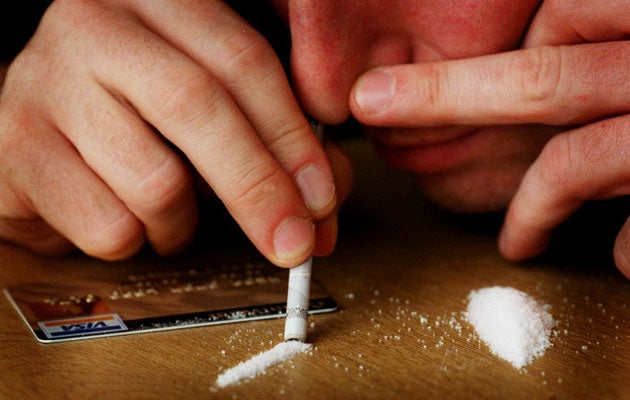Cocaine use trebles in a decade
m Britons take illegal drugs each month; 1 in 3 adults has tried banned substances; 1 in 4 school-aged children has used drugs

Your support helps us to tell the story
From reproductive rights to climate change to Big Tech, The Independent is on the ground when the story is developing. Whether it's investigating the financials of Elon Musk's pro-Trump PAC or producing our latest documentary, 'The A Word', which shines a light on the American women fighting for reproductive rights, we know how important it is to parse out the facts from the messaging.
At such a critical moment in US history, we need reporters on the ground. Your donation allows us to keep sending journalists to speak to both sides of the story.
The Independent is trusted by Americans across the entire political spectrum. And unlike many other quality news outlets, we choose not to lock Americans out of our reporting and analysis with paywalls. We believe quality journalism should be available to everyone, paid for by those who can afford it.
Your support makes all the difference.Almost two million people take illegal drugs at least once a month, with cocaine growing in popularity among teenagers and young adults, the widest-ranging official investigation into Britain's drugs habit has discovered.
Research published by the Department of Health shows that more than one-third of the population has experimented with a banned substance at least once.
One in four secondary age schoolchildren has admitted trying drugs and 10 per cent said they had taken a drug in the previous month. The number of under-16s admitted to hospital after taking illegal drugs has risen by almost half in a decade. The statistics also confirm how commonplace drug use has become in modern Britain, which has some of the highest levels of abuse in Western Europe.
But while recreational users who take cocaine or ecstasy at the weekend are growing, the number of hardened addicts has remained stable and the number of people taking cannabis has fallen.
Harry Shapiro, the director of communications at Drugscope, said: "The heavy heroin and crack-using population is stable and appears to be ageing. We haven't seen an influx of young people at the bottom end."
The explanation may lie with the booming economy of the past decade which has kept unemployment rates low, he added. Heroin use soared in the 1980s as a result of the arrival of a cheap, smokable form of the drug from Iran at the same time as rise in unemployment among young people.
The use of cannabis has declined since it was downgraded from class B to C in 2004. Critics predicted use would rise off the scale but it hadn't happened, Mr Shapiro said.
"There has been a shift in the cannabis market, with home-grown pushing out the imported stuff. But, because it is stronger, people are smoking less of it," he said.
Three million people aged between 16 and 59 – or almost one in 10 of that age group – took drugs in 2007-08, including 960,000 who had used a class A substance such as heroin, crack or cocaine. Some 1.9 million people were classed regular users, having taken an illicit substance in the previous month.
Drug use is at its highest among 16- to 24-year-olds, of whom 1.6 million (21.3 per cent) have taken banned substances in the previous year. Their use of cocaine has more than trebled over the past decade. An estimated 375,000 young adults – 6.1 per cent of people aged 16 to 24 – have taken cocaine in the past year.
There were 10,047 hospital admissions in England for drugs poisoning last year, a rise of 43 per cent in 10 years. There were 38,170 admissions for mental health and behavioural problems caused by drug abuse, more than double the figure of 10 years ago.
The number of people aged 25 to 34 treated for these problems almost doubled to 15,330, while the number aged 16 to 24 went up by 17 per cent to 6,983 and the number of under-16s rose by 48 per cent to 402.
Danny Kushlik, the head of policy at the drugs think-tank Transform, said the Government was burying its head in the sand by refusing to acknowledge that millions of people used drugs safely. "In order to maintain its position on prohibition, the Government has to show that all drug use is dangerous. Politicians find it very difficult to admit that 90 per cent of those who use drugs either have a boring or a fun time. Drug policy is overwhelmingly focused in a very skewed way on problem drug users. We should focus our attention more on managing use rather than mismanaging misuse.
"We need legal control and regulation of drug use. That is how we manage use of alcohol and we need the same for drugs."
A spokeswoman for the Department of Health said: "More people than ever before are getting into and staying in treatment, drug-related deaths are down and the level of drug-fuelled crime has fallen substantially."
Join our commenting forum
Join thought-provoking conversations, follow other Independent readers and see their replies
Comments